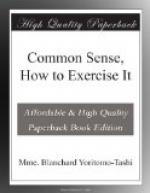“They raised them all up very much hurt, and the first action of the prince, who was injured, was to have arrested the one who, according to him, had evoked an evil fate.
“He was led, then and there, to the nearest village and put into a cell.
“The poor man protested.
“‘I have only done what was natural,’ said he. ’I am going to explain it, but I pray you let me see the prince; I shall not be able to justify myself when he is ill with fever.’
“‘What do you mean,’ they replied, ’do you prophesy that the prince will have a fever?’
“‘He is going to have it.’
“‘You see, you are a sorcerer,’ said the jailer, ‘you make predictions.’
“And then he shut him in prison, to go away and to relate his conversation to them all.
“During this time, they called in a healer who stated that the wounds of the great nobleman were not mortal in themselves, but that the fever which had declared itself could become dangerous.
“He was cured after long months.
“During this time the poor man languished in his prison, from whence he was only taken to appear before the judges.
“Accused of sorcery and of using black magic, he explained very simply that he had foreseen the danger, because in raising his eyes he had noticed that the part of the ground over which the herald had passed was sinking, and that he had drawn the following conclusions:
“The earth seemed to have only a medium thickness.
“Under the feet of the herald he had seen it crumble and fall in.
“He had deduced from this that a weight five times as heavy added to that of the palanquin, would not fail to produce a landslide.
“As to the prediction concerning the fever, it was based on what he had seen when in the war.
“He had then observed that every wound is always followed by a disposition to fever; he therefore could not fail to deduce that the serious contusions occasioned by the fall of the prince would produce the inevitable consequences.
“The judge was very much imprest with the perspicacity of this man; not only did he give him his liberty, but he engaged him in his personal service and in due time enabled him to make his fortune.”
We do not wish to affirm—any more than Yoritomo, for that matter—that fortunate deductions are always so magnificently rewarded as were those of this man.
However, without the causes being so striking, many people have owed their fortune to the faculty which they possest of deducing results where the analogy of the past circumstances suggested to them what would happen.
He warns us against the propensity which we have of too easily avoiding a conclusion which does not accord with our desires.
“Too many people,” said he, “wish to undertake to make deductions by eliminating the elements which deprive them of a desired decision.




